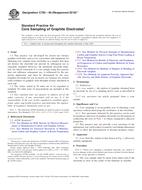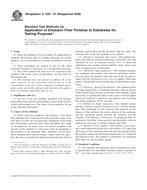We need your consent to use the individual data so that you can see information about your interests, among other things. Click "OK" to give your consent.
ASTM D2047-11
Standard Test Method for Static Coefficient of Friction of Polish-Coated Flooring Surfaces as Measured by the James Machine
STANDARD published on 1.10.2011
The information about the standard:
Designation standards: ASTM D2047-11
Note: WITHDRAWN
Publication date standards: 1.10.2011
SKU: NS-19116
The number of pages: 5
Approximate weight : 15 g (0.03 lbs)
Country: American technical standard
Category: Technical standards ASTM
The category - similar standards:
Other products of the chemical industryFloor treatment appliances
Annotation of standard text ASTM D2047-11 :
Keywords:
coefficient of friction, finishes, flooring, footwear, heel, James Machine, polishes, sole, ICS Number Code 71.100.99 (Other products of the chemical industry), 97.080 (Cleaning appliances)
Additional information
| Significance and Use | ||||||||||||||||||
|
Test Method D2047 establishes a compliance criterion relating static coefficient of friction measurements of flooring surfaces with human locomotion safety. The compliance criterion is based on extensive experiential data from residential, commercial, industrial and institutional walkway surfaces since 1942. Polishes and other floor maintenance coatings having a static coefficient of friction of not less than 0.5, as measured by this test method, have been recognized as providing nonhazardous walkways. Note 1—The value of 0.5 meets the requirements for compliance with Rule 5 on “The use of terms slip retardant, slip resistant, or terms of similar import,” of the Proposed Trade Practice Rules for the Floor Wax and Floor Polish Industry as issued by the Federal Trade Commission on March 17, 1953. The 0.5 static coefficient of friction compliance criterion of this test method is only appropriate for polish-coated surfaces tested in accordance with this machine and test method. The use of this compliance criterion with other test methods, other test instruments, and other surfaces is improper, because they are not a part of the body of experiential data upon which the conformance criterion is based. Note 2—The conformance criteria of this test method may be valid for other surfaces and surface coatings tested by this test method, but this has not been substantiated by correlation with experiential data. |
||||||||||||||||||
| 1. Scope | ||||||||||||||||||
|
1.1 This laboratory test method covers the use of the James Machine for the measurement of the static coefficient of friction of polish-coated flooring surfaces with respect to human locomotion safety. Further, this test method also establishes a compliance criterion to meet the requirement for a nonhazardous polished walkway surface. The test method is not intended for use on “wet” surfaces or on surfaces wherein the texture, projections, profile or clearance between the sculptured pattern of the surface does not permit adequate contact between the machine foot and the test surface. 1.2 This test method is the only method appropriate for testing polishes for specification compliance with the floor polish static coefficient of friction criterion. 1.3 The values stated in inch-pound units are to be regarded as standard. The values given in parentheses are mathematical conversions to SI units that are provided for information only and are not considered standard. 1.4 This standard does not purport to address all of the safety problems, if any, associated with its use. It is the responsibility of the user of this standard to establish appropriate safety and health practices and determine the applicability of regulatory limitations prior to use. |
||||||||||||||||||
| 2. Referenced Documents | ||||||||||||||||||
|
Similar standards:
Historical
1.10.2013
Historical
1.9.2013
Historical
1.6.2009
Historical
1.5.2010
Historical
1.5.2010
Historical
1.3.2008
We recommend:
Technical standards updating
Do you want to make sure you use only the valid technical standards?
We can offer you a solution which will provide you a monthly overview concerning the updating of standards which you use.
Would you like to know more? Look at this page.



 ASTM C651-13
ASTM C651-13 ASTM C767-93(2013)..
ASTM C767-93(2013).. ASTM C769-09
ASTM C769-09 ASTM C783-85(2010)e1..
ASTM C783-85(2010)e1.. ASTM C886-98(2010)e1..
ASTM C886-98(2010)e1.. ASTM D1436-97(2008)..
ASTM D1436-97(2008)..
 Cookies
Cookies
